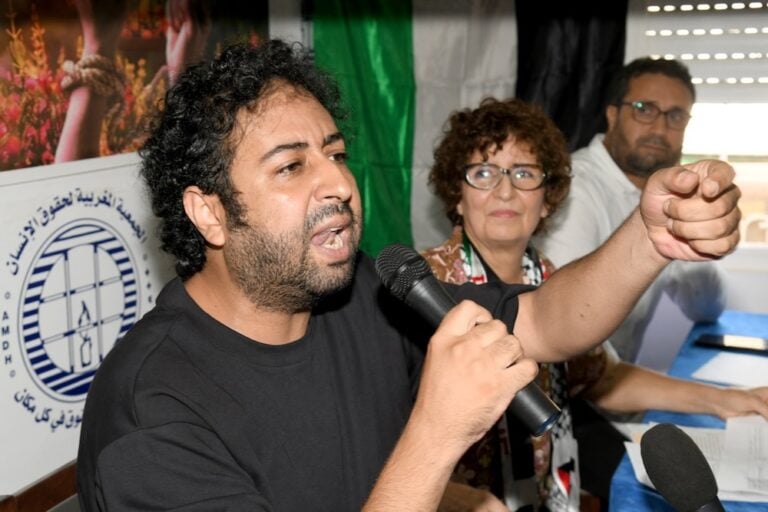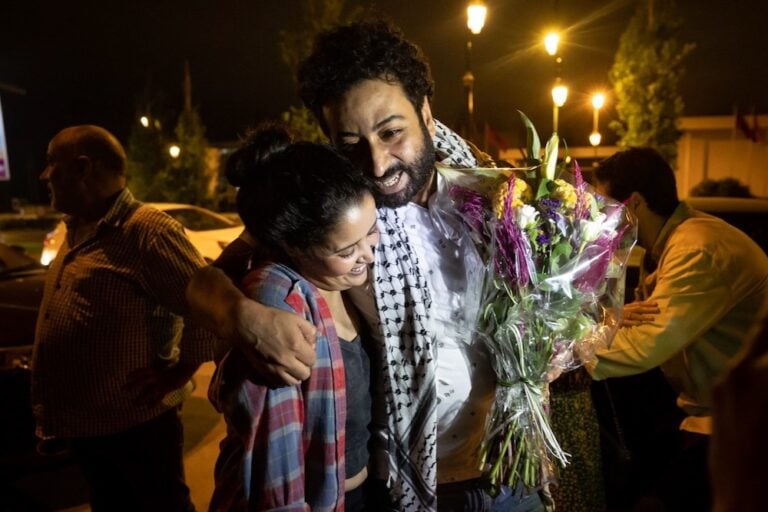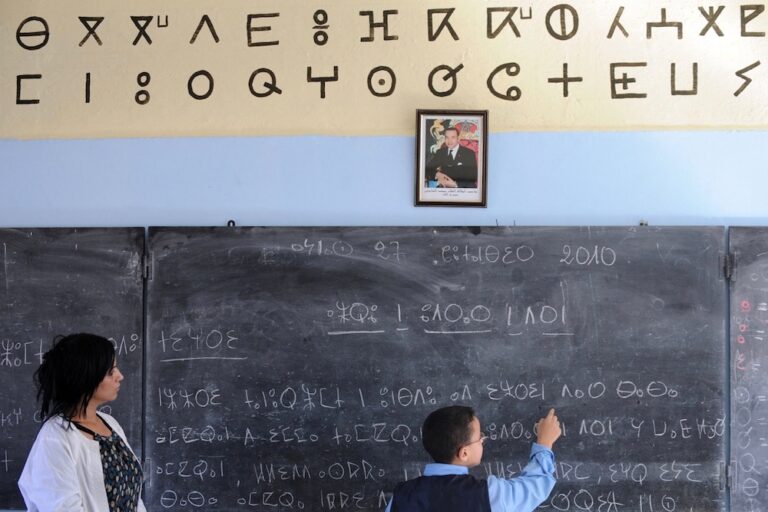A Moroccan military court has sentenced 25 Sahrawis to prison, including nine to life sentences, without looking into their allegations that their confessions were extracted under torture and other forms of coercion.
A Moroccan military court has sentenced 25 Sahrawis to prison, including nine to life sentences, without looking into their allegations that their confessions were extracted under torture and other forms of coercion, Human Rights Watch said today. The defendants include several advocates of human rights and independence for Western Sahara. The confessions were apparently the primary, if not the only, evidence against them, as the court’s written judgment, released the week of March 18, 2013, makes clear.
The Rabat military court sentenced the 25 men, all civilians, on February 17 on charges relating to violent resistance against security forces who, on November 8, 2010, dismantled a protest camp set up by Sahrawis a month earlier at Gdeim Izik, outside the city of El-Ayoun, in Western Sahara. Eleven security force agents and two Sahrawi civilians were killed in that operation and its aftermath.
“While the loss of life at Gdeim Izik is deplorable, the prosecution failed to establish after 26 months of pretrial detention for most defendants a credible case that they were responsible for the violence,” said Sarah Leah Whitson, Middle East and North Africa director at Human Rights Watch. “Time and again, we have seen Moroccan prosecutors appear at politically sensitive trials not with physical or witness evidence establishing the guilt of defendants, but mere confessions obtained under questionable circumstances.”
Morocco should free the convicted Sahrawis or grant them a new and fair trial before a civilian court, Human Rights Watch said. Morocco should also carry out the recent recommendation of its National Council of Human Rights to end military court prosecution of civilians in peacetime. King Mohammed VI was reported on March 2 to have “welcomed” the recommendation.
The trial opened on February 1 after 21 of the detainees had spent more than two years in court-ordered pretrial detention. The court held public hearings with scores of local and international observers in attendance and allowed the defendants for the most part to address the court without interruption. But the decision to try civilians before a military court violated fundamental international norms for a fair trial, Human Rights Watch said.
The defendants may appeal the military court verdicts only to the Court of Cassation, which examines issues of procedure, jurisdiction, abuse of power, and application of the law, but not of fact. In contrast, appeals courts in the civilian court system are permitted to review the facts.
The court apparently admitted the defendants’ confessions as evidence without investigating the defendants’ contentions that the confessions were the product of torture, Human Rights Watch said. The defendants said they were innocent of all charges. Authorities should grant the defendants a new trial by a civilian court and provisionally release them unless it establishes valid grounds for pretrial detention, Human Rights Watch said.
The military court sentenced nine defendants to life in prison, 14 to terms of between 20 and 30 years, and two to the two years of prison already served. All had faced the possibility of the death penalty. The authorities charged all of them with “forming a criminal gang,” most of them with intentional lethal attacks against police, and the others with complicity in these crimes. Two defendants faced the additional charge of “defiling or mutilating” a corpse. The defendants have appealed the verdicts.
The court’s written verdict does not detail the evidentiary basis for finding all of the defendants guilty. Since it mentions no other significant incriminating evidence, the verdict appears to rest on the defendants’ contested confessions to the police. The court rejected defense demands to investigate the defendants’ allegations that police had tortured them and forced them to sign statements they had not read. Instead, the court accepted the prosecutor’s argument that the defendants had failed to request medical examinations when they first appeared before the investigating judge and that too much time had elapsed since then.
While the defendants did not request medical examinations when they appeared before the investigating judge, most of them told him that police had tortured them in custody. Many also told him that the police had forced them to sign or affix their fingerprints to statements that they had not read. The official minutes of these hearings reflect these allegations but the case file contains no evidence that a doctor examined any of the defendants, or that the court investigated the matter, to assess the credibility of their claims.
At the trial, none of the prosecution witnesses could identify any of the defendants as responsible for violent actions. The prosecution produced weapons purportedly seized by the police in the Gdeim Izik camp but did not link them forensically to the defendants. The only link between the defendants and the weapons was their contested confessions.
The prosecution offered little, if any, evidence other than the defendants’ contested confessions to trace the deaths of the security force members to any defendant. The written judgment did not mention how individual defendants were incriminated by the video and photographic evidence shown in court, which show scenes of violence but do not appear to identify the defendants committing crimes.
In a new trial, the court should investigate the defendants’ allegations of torture and ensure, in compliance with international and Moroccan law, that no statement obtained through violence or coercion is admitted into evidence, Human Rights Watch said. If the court decides to admit into evidence a confession to the police that any of the defendants claim was extracted under torture, it should explain in its written judgment why it decided the claims of torture or improper coercion were not credible.
“Morocco’s judiciary undermined the credibility of its own trial by trying these civilian defendants in military courts, flouting international norms and denying them a full right to appeal,” Whitson said. “Even Morocco’s human rights commission is recommending that military courts should not try civilians.”
Background
Morocco seized control of most of Western Sahara in 1975 as Spain withdrew from its former colony. The Polisario Front, which seeks independence for that territory, and Morocco agreed to a United Nations-backed plan in 1991 to allow a referendum on self-determination. However, that vote has not taken place and Morocco administers most of Western Sahara as if it were a part of Morocco, even though the UN does not recognize Moroccan sovereignty and classifies Western Sahara as a “non-self-governing territory.”
In October 2010, Sahrawis set up a makeshift town consisting of about 6,500 tents in the desert at Gdeim Izik, outside of El-Ayoun, to protest their social and economic conditions in Moroccan-controlled Western Sahara. Moroccan authorities entered into negotiations with the protest movement leaders.
On November 8, 2010, security forces moved in to dismantle the settlement. Some camp residents left readily while others resisted the security forces. That set off violent confrontations between Sahrawis and security forces in the camp that spilled over to the city of El-Ayoun, where many public and private buildings and vehicles were damaged. Eleven security officers and two civilians were killed, by the official count; scores more on both sides were injured. A “White Paper on the Gdeim Izik Events” issued by the government of Morocco in February 2013 stated that those killed included four agents of the Gendarmerie, four from the Auxiliary Forces, one from the Armed Forces, one from the National Security, and one from the Civilian Protection.
The authorities contend that pro-independence Sahrawi activists, in alliance with criminal elements, took over and militarized the encampment at Gdeim Izik, prevented its residents from leaving, opposed negotiations with authorities over socio-economic demands, and stockpiled stones, bottles, gas bombs, and other weapons (excluding guns) to resist the security forces who entered on November 8 to evacuate the people living in the makeshift settlement.
During and after the events, security forces arrested hundreds of Sahrawis in connection with the clashes. In addition to the 25 referred to the military court, authorities referred over 120 Sahrawis to trial before the court of El-Ayoun, a civilian court that has jurisdiction because the charges against them did not include causing the death of security agents. The court provisionally released these defendants and has not yet tried them.
A Human Rights Watch observer attended about half of the military court trial sessions. For those dates when he was absent, defense lawyers and other trial observers provided an account of the proceedings. Human Rights Watch examined the case file and interviewed several members of the defense team about the case.
The Defendants
All 25 defendants say they are innocent of the charges. The group includes several people the authorities had previously targeted and imprisoned for their peaceful advocacy of self-determination for Western Sahara and human rights, including Naâma Asfari, Mohamed Tahlil, and Ahmed Sbaï. When he testified at the trial on February 9, 2013, Asfari, who lives near Paris, contended that his activism was the real reason behind his prosecution.
Police arrested Asfari in El-Ayoun the day before they moved in to dismantle the camps and the violence began. The prosecution alleged that Asfari had organized the violent resistance in the camps, but did not claim that he directly participated in it. The authorities arrested 21 of the other defendants, including Tahlil and Sbaï, between November 8 and the end of December 2010. Two other defendants, Mohamed Khouna Babeit and Larbi Elbakai, were arrested in August 2011 and September 2012 respectively. One defendant, Hassanna Alia, was tried in absentia.
The military court sentenced nine defendants, including Sbaï and Alia, to life in prison; four, including Asfari, to 30 years; eight, including Tahlil, to 25 years; and two to 20 years (including Mohamed El-Ayoubi, whom the court provisionally freed pending the final judgment by the Court of Cassation). Two other defendants were sentenced to time served and released. Twenty-one of the defendants are in Salé Prison, serving their sentences. (Judgment 2013/313 of February 17, 2013, in criminal cases #: ع ع 10/2746/3063 and ع ع 10/2746/3063 additional from 1 to 10 and ق س 10/369/3125 additional and ق س 10/369/3125 additional 1 and 2. For a list of defendants and their sentences, please refer to “Related Materials.”)
Authorities had charged all of the defendants with forming a criminal gang, punishable by five to ten years in prison, under articles 293-294 of the penal code. Most also faced a charge of committing an act of violence against members of the security force, “when such violence leads to death, with intent to cause it,” punishable by death, under article 267 of the penal code. Authorities charged those not accused of violence against the security forces with “complicity” in such violence, which carries the same penalties as if they had directly participated in it, under penal code articles 129-130. Authorities added a charge against two defendants, Mohamed Boutanguiza and Sidi Abdallah Abhah, of “defiling or mutilating” a corpse, punishable by two to five years in prison and a fine, under penal code article 271.


